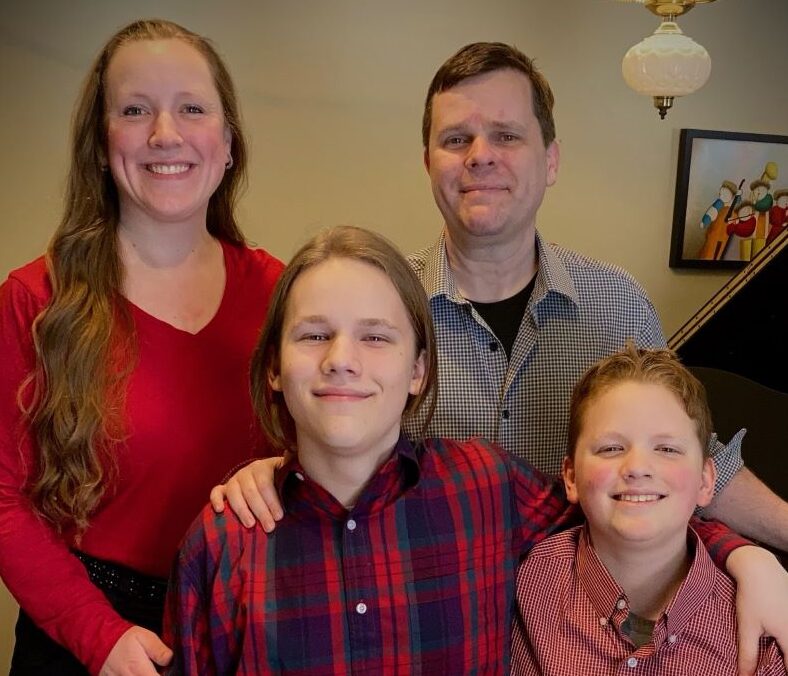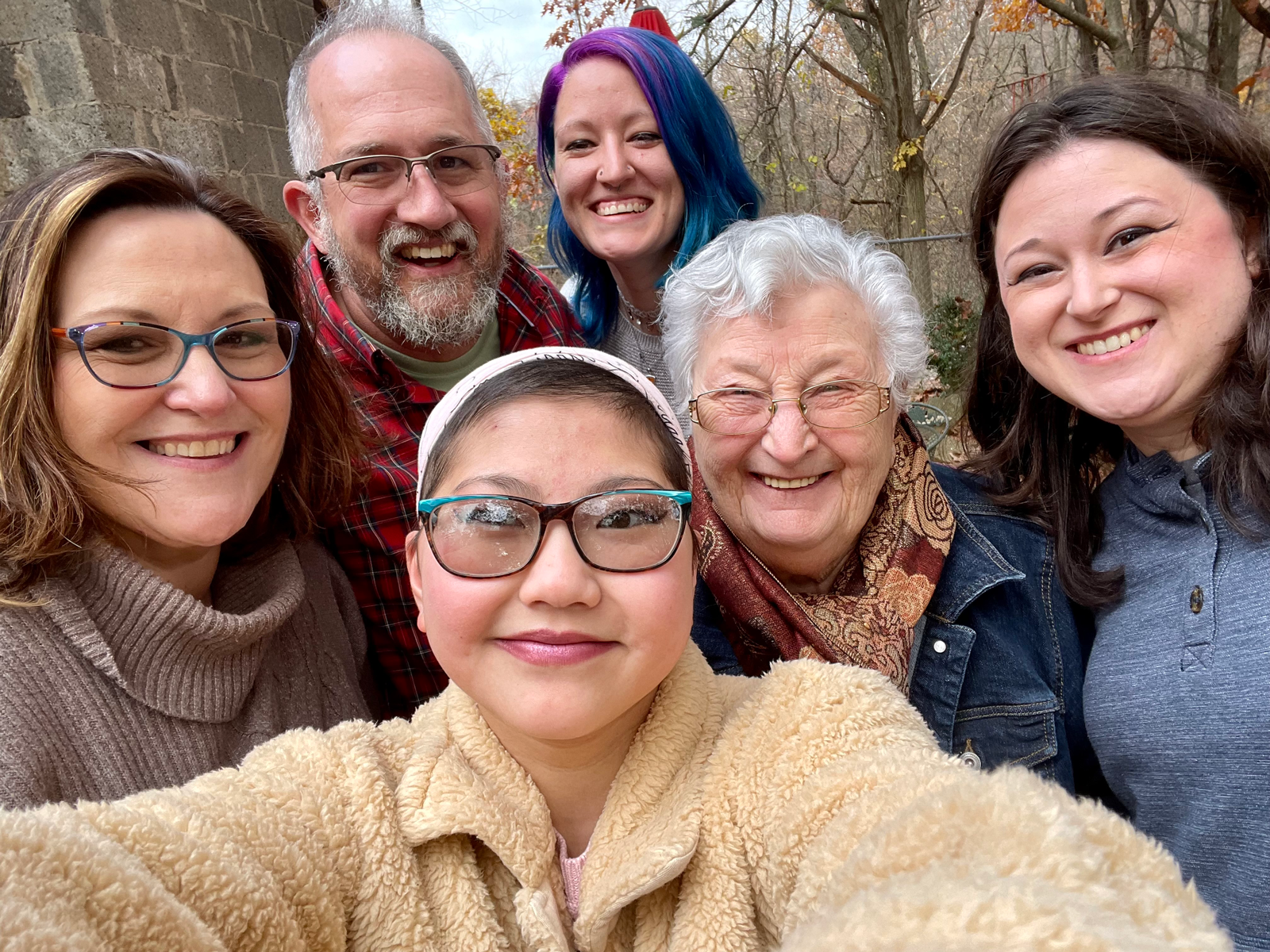Tell us a little bit about your family dynamics.
We are a second-generation homeschooling family. Tim and I have four adopted daughters and two biological daughters, ages 6 to 16. We adopted two sibling sets from foster care. We homeschool five of our six daughters. Being an adoptive family, we know that developing the mother-daughter bond is essential, especially in the case of older child adoptions. This foundational bond supersedes the need of the mother being in the role of teacher and thus impacts educational decisions. Because of this, last year we made the difficult choice to send our youngest daughter to the small local elementary school for her kindergarten year.
How long have you been homeschooling?
We have home-educated our girls from the beginning or, better worded, from birth. This past year, our eldest supplemented her homeschool academics with courses in nursing at a local community college. The youngest, adopted daughter benefitted from the extremely structured days of kindergarten at a public school. Our older, adopted daughter was public schooled, then private schooled as a foster child, and now homeschooled; she loves working at a local horse farm. Another daughter ran track at the middle school; being a homeschooler in public school sports is new for us. Our other two daughters enjoyed a full, good year of homeschooling.
What was one of the main reasons you chose to homeschool?
Honestly, homeschooling was the most familiar to us as Tim and I were homeschooled. I also love having my children with me. Being an adoptive family through foster care, homeschooling offers unique and unparalleled flexibility. When a child is in foster care, reunification with his or her family is the goal, so flexibility is essential in order to fulfill the duties of visits and appointments that come with a new placement. In some cases, adoptive parents may be granted educational custody to direct the foster child’s education, otherwise the educational authority is retained by the state. As I look back, our reasons to homeschool have evolved from a fear-based stance within an isolating church culture to a more joyful choice to school our children at home with the liberty and freedom to teach family Christian values along with every subject.
 In what activities does your family participate?
In what activities does your family participate?
LOTS. First of all, once a week, we participate in an academic co-op of which I am the president. We have violin, piano, and electric guitar lessons—each of our daughters being interested in different instruments and music styles. One participated in track at the public school. Another is involved with an YFC (Youth for Christ) ministry to girls called Girl Talk. We are active members in our church. The older girls have sought out work opportunities. We have two dogs, two goats, a cat, and a leopard gecko. We love boating, fishing, hiking, kayaking, and just being outdoors.
What have been your most helpful resources?
Our participation in the co-op has been most helpful. Our co-op is non-denominational, faith-based. We also have many adoptive families participating, which has been especially encouraging to us. Connections with these mothers and families encourage us in our family journey. Also, being in a co-op, we have the ability to see the range of abilities within any certain age.
My mom, a veteran homeschooler, is also a great support. I especially appreciate the classic homeschool books that she has passed down to me.
Books that have been helpful are A Charlotte Mason Education: A Home Schooling How-To Manual and More Charlotte Mason Education: A Home Schooling How-To Manual, both by Catherine Levison; Teaching from Rest: A Homeschooler’s Guide to Unshakeable Peace, by Sarah Mackenzie; Mere Motherhood: Morning Times, Nursery Rhymes, and My Journey toward Sanctification, by Cindy Rollins; and Gentle and Lowly, by Dane Ortlund.
I also glean information from Facebook groups that align with our style of education.
 What educational philosophy/curriculum do you follow?
What educational philosophy/curriculum do you follow?
We follow a mixture of Charlotte Mason and Scholé, or restful classical learning. We use Apologia textbooks for high school science in the co-op, Master Books for the younger students, and online Teaching Textbooks for math with parent tutors. We enjoy reading living books in all subjects and sometimes supplement with Progeny Press study guides.
What has been one of the highlights for you in homeschooling your children?
Teaching them to read; seeing that click. Being able to tailor learning to interests and seeing the excitement firsthand.
What was your favorite field trip(s)?
We love the Baltimore Aquarium; we have a family membership and go there quite often. We enjoy small town festivals or old fashioned days where we witness the crafts of long ago, like leather tooling and glass blowing.
What was one of the funniest things to happen during a homeschool day?
We have a big picture window that birds often crash into. One day, we raced outside to sketch a stunned woodpecker! Looking for humor in the everyday chaos makes the perfect homeschool day.
What have you found to be a challenge in homeschooling?
MATH! And the everyday juggle of providing healthy meals and clean laundry. There is often a difference between the expectations I have for a child and the reality of what that child can do. Foster children lose years of their lives from trauma and their heightened drive for survival; those lost years cause delays. At times we feel like we are failing and put unneeded pressure on ourselves. I can no more take credit for my child’s wins than the losses. It’s a process of trusting God with every aspect of my life. I must remember that ultimately what is most important is that Tim and I and our children—biological and adopted—strive to be like Christ, gentle and lowly. “Take my yoke upon you, and learn from me, for I am gentle and lowly in heart, and you will find rest for your souls” (Matt. 11:29, ESV).
Any tips in dealing with that challenge?
Start the day with Jesus. Center yourself in Him before you begin to help your children. This doesn’t have to be an IG-post-worthy cup of coffee and beautiful devotion sketching moment; it can be a worship song playing as you make breakfast; it can be a whispered prayer as you comfort an upset child or a quick snatch of just one Psalm to set your heart on through the day. Rejoice in the sacred ordinary moments of your life.
What advice would you give to someone who has just begun homeschooling?
Again, start the day with Jesus. Find a community of supportive, like-minded people to meet with where you can learn what you want to do and how to do it. A community that has a variety of homeschooling types is helpful. I recommend not focusing on an academic co-op until a child is at least in first grade, but possibly consider a field trip homeschool group for those early years. Do NOT second-guess yourself: you are the parent; you know your child.
As a homeschooling adoptive family, what advice would you offer to others considering foster care?
There are approximately 14,000 children in foster care in Pennsylvania. Let that number sink into your mind and let it make you feel uncomfortable. If you are at a point where you are unable to become a foster family, please don’t let that stop you from ministering to the children and families in your community. Encourage your church to become trauma informed so that they can support foster and adoptive families. Make a meal for a foster family. Drop off groceries at their door. Write them a card of encouragement. Above all else, pray without ceasing for them. Foster care and adoption are hard and sacred things to be a part of. Your family will be changed as you make the choice to bring children coming from places of brokenness and pain into your family; yet with that pain comes so much beauty and joy as a new family is formed and as love takes root.
These questions were answered during a phone interview on 5/6/2022, which was during National Foster Care Month. Margaret Grimm, CHAP Digital Magazine Editor, transcribed Sarah’s answers then submitted them to Sarah for her revisions and approval. The final interview question was added to elaborate further on Tim and Sarah’s experience as foster and adoptive parents and encourage other homeschooling families consider foster care.




You must be logged in to post a comment.